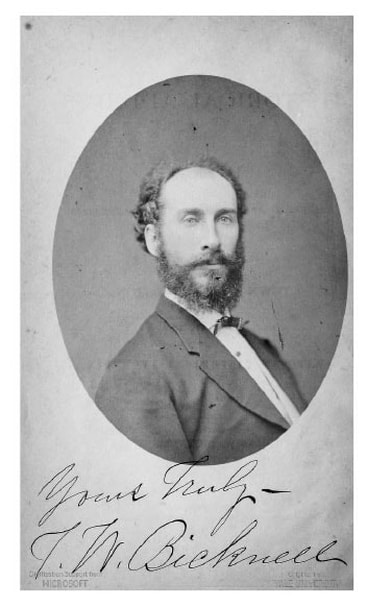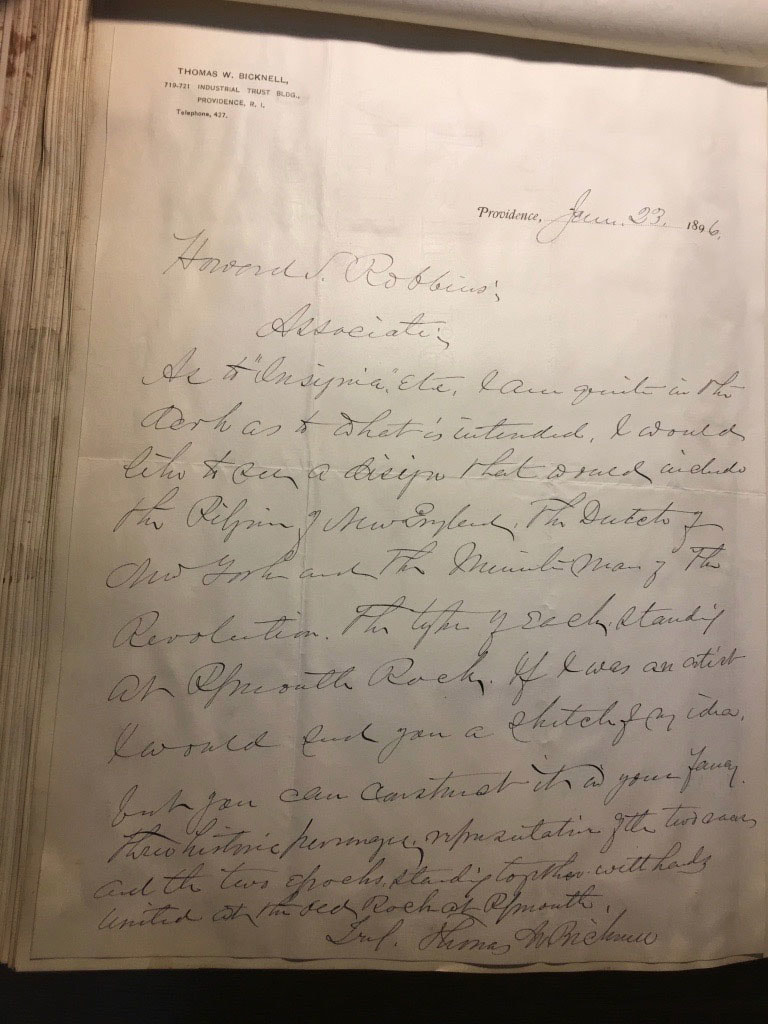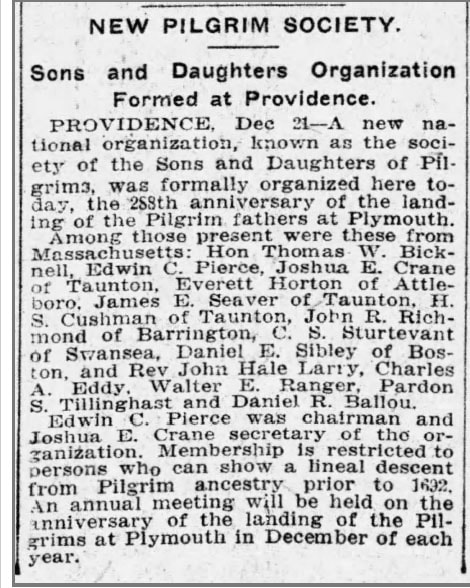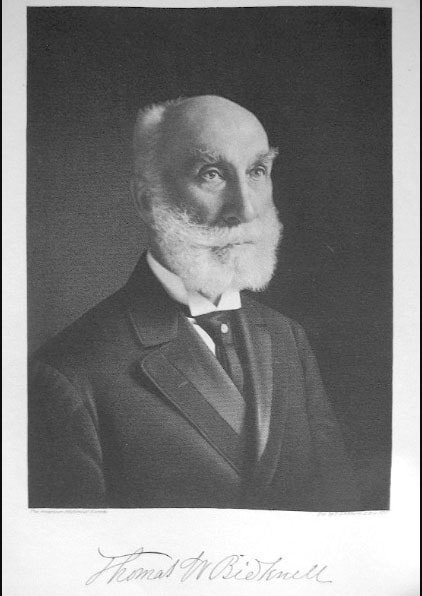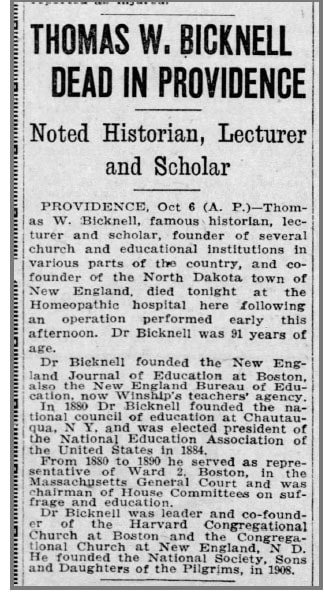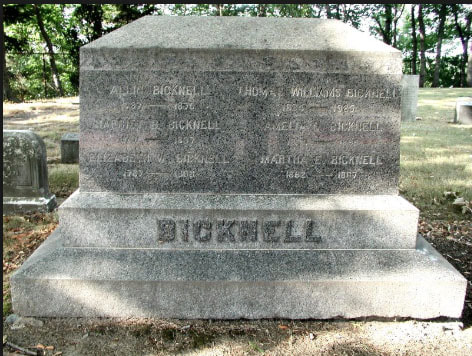FOUNDER OF THE SOCIETYBorn in Barrington, Rhode Island on September 6, 1834, Thomas Williams Bicknell was the son of Harriet Byron Barrington and Rhode Island minister and Senator, Lt. Col. Allin Bicknell. Thomas Williams Bicknell was a figure long influential in New England educational circles. After being educated at Thetford Academy, Amherst College, and Brown University (M.A., 1860), Bicknell became a principal in Bristol, R.I. (1860-1864; 1867-1869), also serving in Providence (1864-1867). In 1869, he was named State Commissioner of Public Schools, which post he held until 1874. He became active in the American Institute of Instruction and was named editor of the New England Journal of Education. He also edited The Leader (Boston, 1875-1904) and became active in the National Education Association, of which he was elected president in 1883.
Bicknell also was a man of patriotic fervor and civic duty. He was president in over thirty associations and organizations, and was a member in more than a hundred. |
He helped established the U.S. Postal Code system as a member of the 1878 Postal Congress. He joined the Rhode Island Society of the Sons of the American Revolution (1896), founded the Rhode Island Society of The Order of the Order of the Founders and Patriots of America (1898), and founded The National Society of the Sons and Daughters of the Pilgrims (1908). His interest in genealogy is amply demonstrated in his writings.
With a devotion to the principles and virtues the Pilgrims brought to America, Thomas W. Bicknell played a prominent role in the observance of the 300th anniversary of the signing of the Mayflower Compact. According to the November 21, 1920 edition of the Boston Sunday Post, “The observance started with a pilgrimage to Plymouth Rock by members of the National Society of the Sons and Daughters of the Pilgrims and other Mayflower descendants who came from out of town… After the Pilgrims had gathered at the rock Thomas W. Bicknell of Providence, who is secretary and treasurer-general of the society, opened the exercises by stating that they had come to gain inspiration from Plymouth Rock, the cornerstone of the republic. He then invited all present who had Pilgrim blood in their veins to come forward and step on the rock where their ancestors had disembarked from the Mayflower 300 years ago.”
Bicknell was an author, editor, and publisher. Among his notable works cherished by the National Society Sons and Daughters of the Pilgrims is his poem, Early Pilgrims:
With a devotion to the principles and virtues the Pilgrims brought to America, Thomas W. Bicknell played a prominent role in the observance of the 300th anniversary of the signing of the Mayflower Compact. According to the November 21, 1920 edition of the Boston Sunday Post, “The observance started with a pilgrimage to Plymouth Rock by members of the National Society of the Sons and Daughters of the Pilgrims and other Mayflower descendants who came from out of town… After the Pilgrims had gathered at the rock Thomas W. Bicknell of Providence, who is secretary and treasurer-general of the society, opened the exercises by stating that they had come to gain inspiration from Plymouth Rock, the cornerstone of the republic. He then invited all present who had Pilgrim blood in their veins to come forward and step on the rock where their ancestors had disembarked from the Mayflower 300 years ago.”
Bicknell was an author, editor, and publisher. Among his notable works cherished by the National Society Sons and Daughters of the Pilgrims is his poem, Early Pilgrims:
Early Pilgrims
By Thomas W. Bicknell
We meet where ancient altar fires
Were kindled by ancestral sires,
And grateful homage here we pay
To worthies of an earlier day.
Our Mecca this, a scared shrine,
Made holy by the Face Divine;
Our Salem, where the joyful lays
The tribes once met for prayer and praise.
‘Twas Israel’s wont, at Zion’s seat,
The story and the song repeat
Of captive days, of grand release
From Pharoah’sbonds to Canaan’s peace.
They sang again sweet Miriam’s strains
That echoed over Goshen’s plains;
As horse and rider filled the sea,
“Jehovah triumphed gloriously.”
At Marah’s springs they drank anew,
Till bitter waters sweeter grew;
‘Neath Elim’s palms they slaked their thirst
And gained new strength by days of rest.
Across the desert sands they stray, -
Their guide the pillared cloud by day;
In darksome night, the stars their tent,
O’eraching God’s firmament.
Ere yet the Promised Land they spy,
For Egypt’s leeks and corn they cry:
E’en Joshua’s speech of fruitful vines
And corn and wine are empty signs.
But on they press at Moses’ word,
And reach the Sacred Mount of God,
Where blessed anew with Law and Love,
They pledge their faith in Heaven above.
Through Moab’s land, past Nebo’s cave
Where Israel’s leader found his grave;
His strength still new, his vision bright,
He rested there ‘neath Heaven’s sweet light.
“On Jordan’s stormy banks they stand,”
And view their Canaan, promised Land,
Its waters feel their Master’s wand
And swift obey His great command.
These earlier Pilgrims find their home,
Where God has made them plenteous room;
The rocks yield honey, milk their kine,
They seek His precepts all divine.
To the high theme of Pilgrim days,
In modern lands, our thoughts we raise,
And trace the path the fathers trod,
Who lived and walked and died with God.
- From “Historical Addresses, Poem, and Other Exercises at the Celebration of the Two Hundred Fiftieth Anniversary of the Settlement of Rehoboth, Mass. Held October 3, 1894, edited by Thomas W. Bicknell, A.M. LL. D.”
By Thomas W. Bicknell
We meet where ancient altar fires
Were kindled by ancestral sires,
And grateful homage here we pay
To worthies of an earlier day.
Our Mecca this, a scared shrine,
Made holy by the Face Divine;
Our Salem, where the joyful lays
The tribes once met for prayer and praise.
‘Twas Israel’s wont, at Zion’s seat,
The story and the song repeat
Of captive days, of grand release
From Pharoah’sbonds to Canaan’s peace.
They sang again sweet Miriam’s strains
That echoed over Goshen’s plains;
As horse and rider filled the sea,
“Jehovah triumphed gloriously.”
At Marah’s springs they drank anew,
Till bitter waters sweeter grew;
‘Neath Elim’s palms they slaked their thirst
And gained new strength by days of rest.
Across the desert sands they stray, -
Their guide the pillared cloud by day;
In darksome night, the stars their tent,
O’eraching God’s firmament.
Ere yet the Promised Land they spy,
For Egypt’s leeks and corn they cry:
E’en Joshua’s speech of fruitful vines
And corn and wine are empty signs.
But on they press at Moses’ word,
And reach the Sacred Mount of God,
Where blessed anew with Law and Love,
They pledge their faith in Heaven above.
Through Moab’s land, past Nebo’s cave
Where Israel’s leader found his grave;
His strength still new, his vision bright,
He rested there ‘neath Heaven’s sweet light.
“On Jordan’s stormy banks they stand,”
And view their Canaan, promised Land,
Its waters feel their Master’s wand
And swift obey His great command.
These earlier Pilgrims find their home,
Where God has made them plenteous room;
The rocks yield honey, milk their kine,
They seek His precepts all divine.
To the high theme of Pilgrim days,
In modern lands, our thoughts we raise,
And trace the path the fathers trod,
Who lived and walked and died with God.
- From “Historical Addresses, Poem, and Other Exercises at the Celebration of the Two Hundred Fiftieth Anniversary of the Settlement of Rehoboth, Mass. Held October 3, 1894, edited by Thomas W. Bicknell, A.M. LL. D.”
Thomas W. Bicknell died on August 13, 1896 at age 91. His obituary noted he was a famous historian, lecturer and scholar, founder of several church and educational institutions in various parts of the country, co-founder of the North Dakota town of New England, president of the National Education Association of the United States, chairman of suffrage and education in the Massachusetts General Court, and founder of the National Society Sons and Daughters of the Pilgrims. To read Thomas W. Bicknell's detailed family history, please click here.
